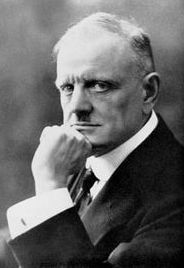
A few weeks back a colleague called me, laughing about a story in a daily. The article had described what a concertmaster’s requirements are: not only are they expected to rehearse the orchestra, or at least the strings (although it was unclear when and how this would be possible), they also had to be auditioned with their drinking skills, at social gatherings. This is what I call
CPF, the
Cocktail Party Factor. Juilliard and other schools, take notice: perhaps you better hire an experienced bartender to give classes in meaningless chit-chat. It is unclear if this
brown-nosing ability also produces a
dark sound of the same color, another requirement. It is unlikely to boost one’s intelligence, however, also needed. Granted, I don't drink, but in other areas I might be overqualified: after all, the London Times once claimed that I had
'an impressive depth of sonority', and my IQ was the highest the tester had ever measured.
Since it has been made public as to what a concertmaster should be like, I take this opportunity to describe a good conductor. One of my readers recently emailed me with the question and I promised to reply in this blog.
Many orchestra conductors falsely believe that a big ego and basic, rudimentary musical skills are all that is necessary. You can fool some of the people some of the time, but not all the people all of the time. An ideal conductor is also a performing artist, a practicing instrumentalist of top caliber. Although thorough knowledge of string instruments is mandatory, one doesn’t have to be a soloist in that field. There are many ways to gain the necessary know-how; however, having one’s children play at Suzuki level is not enough. There are pianists who have made great conductors, same with composers, although to a lesser extent. In both these cases the individuals have a great ear for harmony and colors. Wind and brass players often suffer from the fact that they would like the orchestra to sound as if all the listeners sat in their respective sections.
Personality is number one on my list. Conductor/orchestra relationship is like a marriage. Recently ‘falling in love’ and the ‘honeymoon period’ have been scientifically explained very well. Excess amounts of serotonin, dopamine and other neurotransmitters stop working after about a year in a relationship. Since in an orchestra setup musicians don’t have to see their regular conductor daily, this period may be extended. Having guest conductors could be compared to love affairs: they can be wonderful or disastrous, but luckily they don’t last forever, and later it is nice to meet an old flame again when a guest maestro reappears. In a long-term marriage a hormone, oxytocin, takes over to sustain the relationship. Often life becomes routine, though, and so does the orchestra’s playing. Audience, and in most cases, the musicians as well, long for excitement and the cycle ought to start over.
Mental health is an important issue in any artist’s life. Creativity and madness often go hand in hand. In an orchestra this is very evident, especially when you factor in the frustration of a musician not being able to express the artist in him/herself, just having to follow someone else’s ideas. A good conductor, just like a good teacher, should be thoroughly schooled in psychology, to the point that he/she could actually be a practicing professional in that field. Being kind, nice, understanding and yet demanding is not an easy combination. CPF should be a very minor factor for conductors as well. Granted, money needs to be raised, but wouldn’t it be nice if that part of the business could be left for people specialized in that field? Too many great conductors refuse posts as Music Directors in our country, just because of the CPF portion of the job.
As I recently wrote, fear and inspiration can produce similar results in a short run. But if you are in a musician’s shoes, I don’t think too many would choose the fear over niceness, kindness and inspiration. Time for rehearsing is increasingly limited and a conductor has to be able to maximize it. It is amazing how people can often exceed their limitations and perform miracles: sometimes even the first concert of many in a row turns out to be decent, although it has a resemblance to instant art: just add water and mix. If I had to attend a concert as a listener, I would probably choose the last one in the series, although some musicians may falsely believe that they don’t have to try as hard as on previous occasions, and end up not giving their best. Sometimes a rush of adrenaline is great, but most often musicians try to counter it with the use of beta-blockers, alcohol or other drugs.
The person, who inspired me to write this, sounds like a very insightful person, and talks about his desire to treat musicians with great understanding and ‘utmost respect’. I didn’t know such wonderful people still existed, although I have crossed paths with a few, such as the late Hermann Michael. I want to wish all the best to such a conductor, as an orchestra will be blessed to have a human being like that at their helm.










